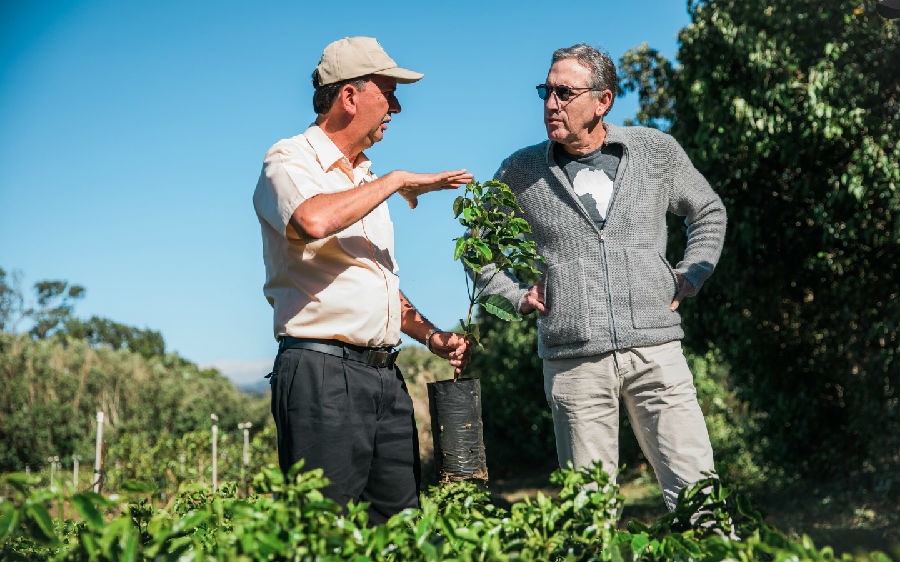In Costa Rica, farmers say climate change has already made it difficult to predict harvest conditions.
哥斯达黎加的农民们说,因为气候变化,他们已经很难预测收成。
“One year it’s too short, one year it’s too long,” says Corrales Cruz of the rainy season.
谈到雨季时,科拉罗斯·克鲁斯说:“有的年份(雨季)太短,有的年份又太长”。
The nation’s coffee industry is suffering as a result.
这样一来,受伤的就是这个国家的咖啡业。
Fifteen years ago the average coffee farm in Costa Rica produced about 14.5 bags of coffee per acre.
15年前,该国咖啡的平均产量为14.5袋/英亩。
Today that number is down to fewer than 10 bags per acre.
如今,这一数字已经缩减至不到10袋。
It’s a harbinger for the coffee industry, and a sign of the seriousness of its adaptation challenge:
这不仅是灾难的前兆,也是咖啡行业适应气候变化这一挑战的严重性的一个标志:
climate change is happening now, and it is happening fast.
气候变化已经开始,其势犹如破竹。
Remaking the complex system of trees, plants and wildlife that allow for coffee to thrive in a particular place
咖啡要在某个特定的地方茁壮成长,就需要树木、农作物以及野生动物共同构成的,复杂而特殊的生态系统,
takes careful consideration over an extended period of time.
重建这一系统需要长时间的深思熟虑。
“Changes we make today,” says Peter Laderach,
“我们今天所做的改变,”
a climate change specialist at the Colombia-based International Center for Tropical Agriculture,
位于哥伦比亚的国际热带农业中心的气候变化专家彼得·莱德拉赫说道,
“may only be yielding fruits in five or 10 years.”
“其成果如何,要5~10年后才能看到。”
And no matter how much money the industry pumps into research, or how many boots companies put on the ground for retraining,
无论行业投入多少资金开展研究,也无论企业投入多少人力物力再培训农民,
the future of coffee remains at the mercy of a global population that continues to pump greenhouse gases into the atmosphere.
咖啡的未来依旧系于仍在继续向大气排放温室气体的世界人民的股掌之间。
Average temperatures are expected to rise by more than 5.5°F by 2100
联合国环境规划署的数据显示,到2100年,
even if countries follow through on their commitments to reduce global warming, according to data from the U.N. Environmental Programme.
即便各国贯彻减缓全球变暖这一承诺,全球气温仍将上升5.5°F以上,

That’s far short of the U.N. goal of keeping temperature rise below 3.6°F.
远高于联合国制定的,将气温上升幅度控制在3.6°F以内这一目标。
All this has stark implications for the future of coffee.
上述种种都将对咖啡的未来产生不可磨灭的影响。
Which may be why Schultz, back at the Starbucks farm, segues unprompted into a discussion of government policy
这或许就是我们在俯瞰农场的会议室聊天时,再次回到星巴克农场的舒尔茨
as we chat in a conference room overlooking the farm.
会不由自主地谈论起政府政策的原因。
He tells me that the U.S. needs to work to mitigate climate change and return to the Paris Agreement,
他告诉我,美国应当努力缓解气候变化
which the Trump Administration announced in 2017 that it would leave.
并重回特朗普政府在2017年宣布将会退出的《巴黎协定》。
“We have to remove ourselves from the politics,” he says,
“我们只能远离政治,”他说,
“and do everything we can to preserve and enhance our industry and our company.”
“全力保护和提升我们的行业和企业。”
(Schultz, who is often discussed as a potential Democratic presidential candidate,
(尽管舒尔茨经常被人们视为潜在的民主党总统候选人,
stressed that he remains a private citizen despite at times sounding ready for the campaign trail.)
他强调,虽然他的有些行为看似是在为竞选做准备,自己的确只是一个普通公民。)
As we leave the Starbucks farm, Bogantes Vargas, the daughter of a coffee farmer,
我们离开星巴克农场之际,其父就是咖啡种植户的博甘蒂斯·瓦格斯
points out the old coffee plantations that have closed as a result of years of water shortages.
为我们指了几处因为连年缺水现已关闭的老种植园。
Some have been converted into resort homes for foreigners.
其中一些被改造成了面向外国游客的度假村。
Others lie abandoned.
另一些则被遗弃了。
The fields, lush in some places but brown in others, are a reminder
这些田地,一些显得郁郁葱葱,另一些却是空无一物,它们无不提醒着我们,
that Schultz, the coffee industry and the authorities charged with stopping climate change need to move fast.
舒尔茨、咖啡行业,当局等负责阻止气候变化的所有人都需要迅速行动起来。



